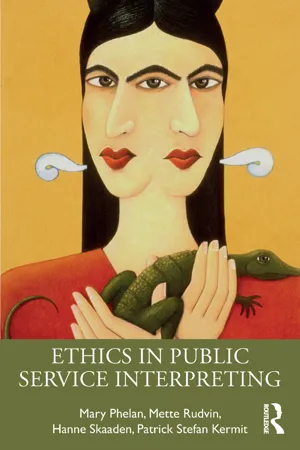1.1.1 Sector-specific interpreting: interpreter agency and ethical challenges1
Interpreting has grown and developed significantly as a profession and as an academic discipline in the past few decades. Concomitantly, the discipline of Interpreting Studies (hereafter IS), departing from the exclusive elitist realm of conference interpreting, has branched out into a set of sectorial sub-disciplines — medical interpreting, legal interpreting, interpreting in the education sector, business interpreting, interpreting for the media or for tourism, diplomatic interpreting, etc. This increased segmentation is reflected both in the literature and in the plethora of training programmes specific to each sector. The terminology used to denote the macro-sector of dialogic, face-to-face interpreting in public and private institutions is also somewhat fragmented, although largely referred to as Public Service Interpreting (hereafter PSI) and Community Interpreting (hereafter CI), whereas Liaison Interpreting has lost currency. The issue of professional ethics has received increasing attention in Interpreting and Translation Studies generally, but nowhere more so than in the field of PSI.2
This rather fragmented landscape begs the question of whether or not we can speak of a general ‘ethics of interpreting’, and if so, can we speak of a collective set of shared ethics that derives its authority from the consensus of the professional community (i.e. an ‘external’ Code of Ethics), or does each sector require a specific code? By the same token, are interpreters governed by the rules that apply to the various domains, practices and stakeholders involved? These would be: (1) the public and private institutions that require their language services (hospitals, public offices, legal institutions for interpreters, or the client for translators); (2) the professional associaliou, companies or cooperatives they belong to; (3) the institution (if they have received dedicated training). Alternatively, is ethics driven by (4) an intrinsic, unwritten rule governiv iransfer, or by (5) a privately-driven ‘internal’ ethics by which a single interpreter examines his or her own conscience internally and acts accordingly? Operating with at least these different levels of ethics, the picture is clearly very complex and may lead to situations in which the interpreter is unsure of which ethical level or source he or she should follow, especially if the guidelines or injunctions at the various levels overlap or clash.
The development of IS into increasingly specialised areas of research and practice has had significant implications for the perception of the interpreter’s role in the international literature on interpreting. It has brought to the surface and into public debate important issues related to interpreter agency and the degree to which the interpreter is ‘visible’ and ‘proactive’ in the interpreting assignment. The debate has led to a bifurcation of schools of thought in the PSI literature represented very broadly by what Sandra Hale (2007) calls the ‘mediated approach’ vs the ‘direct approach’. Where the first approach tends to accept more active engagement by the interpreter, the latter is more cautious regarding the degree to which an interpreter should enter proactively in the interpreting process by providing additional information or otherwise enacting overt alterations. This bifurcation also represents a broader paradigm shift in the humanities (see Rudvin 2006) towards a wider acknowledgement of the reader’s (or interpreter’s) agency in the communicative event. It has also led to a new set of metaphors reflecting that higher degree of agency and engagement, exemplifying this shift: from a ‘pane of glass/conduit’ to ‘bridge’, from ‘translator’ to ‘conversation coordinator’, from ‘invisible’ to ‘visible’. Consequently, the code of conduct3 and ethics that the interpreters abide by also reflect the changing epistemological and methodological framework that guides and governs them.
There is arguably a natural correlation between ethics and PSI practice, motivating the prominence of ethics in PSI literature. The most important reasons for this correlation can be captured in the following features:
• The nature of PSI is highly dialogic, interpersonal and collective, often played out in public and institutional domains of power asymmetry. This power asymmetry may lead to deliberate (or unintentional) abuses of power at the level of language or the para-verbal level.
• The PSI interpreting mode is immediate and requires split-second decision-making; this is obviously also true of conference interpreting, but in PSI settings non-verbal behaviour is an inherent part of the communicative act. Subsequently, communication strategies need to be reflected upon and learned through training beforehand so that they become internalised and to some degree ‘automatic’.
• PSI is deeply engaging in human terms because of the face-to-face format that requires immediate and constant interaction with other participants. PSI interpreters must therefore often engage not only with their interlocutors’ propositional and pragmatic intentions but also their affect-driven utterances and behaviour.
• PSI is deeply context-dependent and the settings shift from one institutional and life domain to another, requiring flexibility and adaptation as well as familiarity with the behaviours, norms and terminology of each sector, each with their own particular socio-cultural and institutional constraints.
• PSI is by definition an intercultural activity.4 This may lead to a highly complex communicative process involving cultural, social and pragmatic features relating to socio-cultural interpersonal relations.
The responsibility for negotiating such complex factors can be a heavy burden on the interpreter and necessitates ethical guidelines to guide and advise, and to help interpreters minimise any potential damage to other interlocutors. The twin aspects of power-asymmetry and vulnerability require special attention and delicacy in order not to cause harm to the foreign-language speakers or to the communities and institutions served by the interpreters.
